Legion of Super-Heroes: Millennium #1 (of 2)
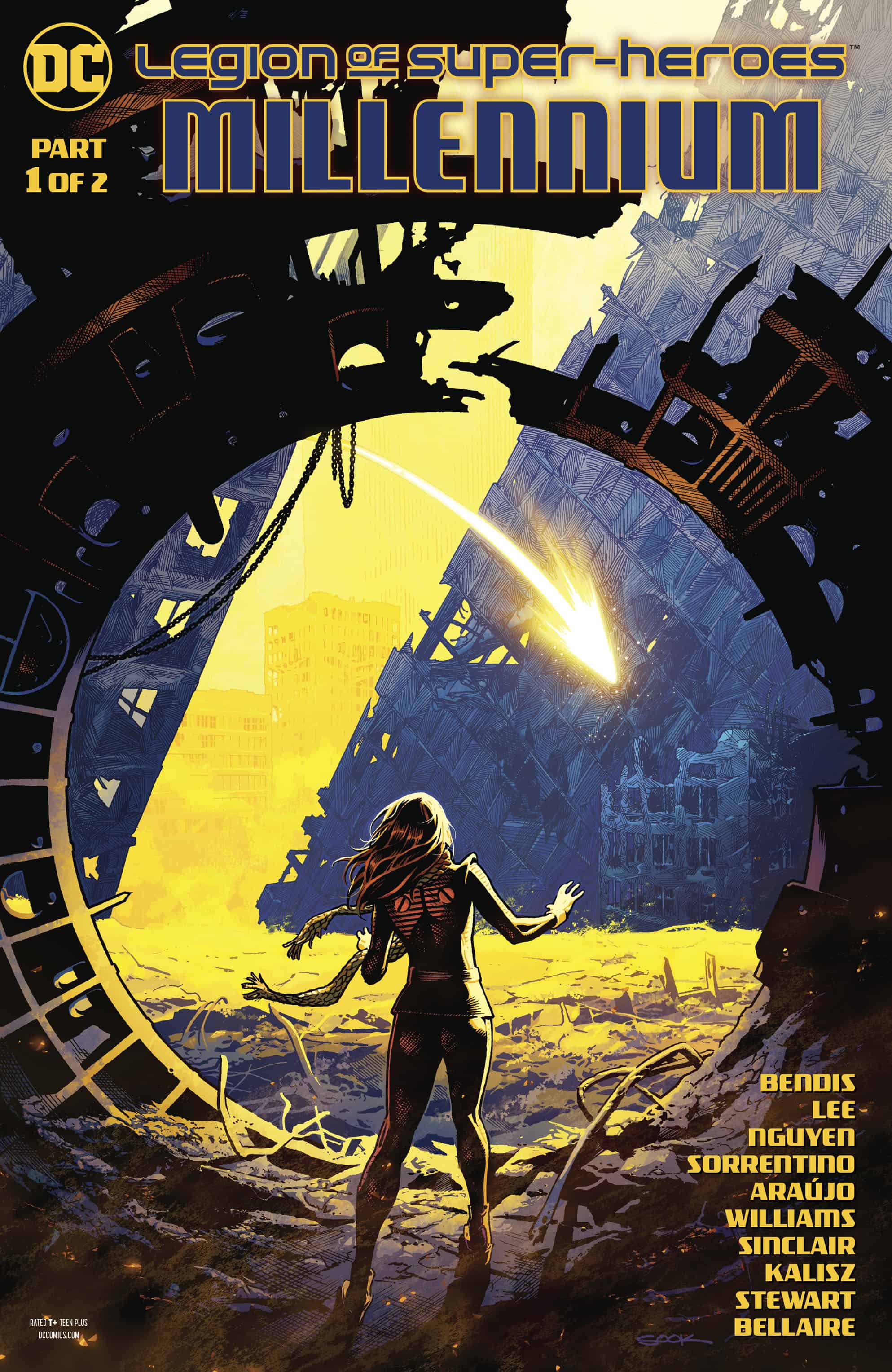
Recap
In the distant future, a seemingly-ordinary woman begs for help… she’s been alive for centuries, and has witnessed much. Join her on a journey through the future history of the DC universe!

Review
[MAJOR SPOILERS AHEAD! DON’T SAY YOU WEREN’T WARNED!]
[READY?]
[GO!]
For months now, writer Brian Michael Bendis has been teasing, hinting at his major Legion of Super-Heroes relaunch. Fans have clamored and kvetched in equal measure (depending on their individual ratio of love of Legion versus loathing of Bendis), and finally, it’s… almost here.
Legion of Super-Heroes: Millennium #1 functions as a kind of prologue to the Legion’s return to a solo title, and proper prominence in the DC Universe. That’s good news! The bad news is, the Legion is nowhere to be found within its pages. And the ugly news is, our shrouded-in-mystery-for-months POV character journeying through future history isn’t actually anyone important in the larger scheme of things.
Part of the hype for this series as been the plot description: “A person, not aging, moves through DC’s own future history and it all leads up to the Legion!” Who was this mystery woman? (That info was spoiled recently, but for the sake of argument, let’s assume it wasn’t.) So much was promised, with virtually limitless potential: Kamandi! Batman Begins! Tommy Tomorrow! et al. Everything, all of DC’s myriad futures, laid out in one big narrative to give a larger sense of scope to the DCU post-“Rebirth.” It’s an awesome concept, potentially positioned to redefine the DCU for years to come.
That’s all well and good in theory. Execution, unfortunately, is another story.
Let’s start with our mysterious POV character. It’s no big secret that Bendis likes to groom obscure pet characters and push them into prominence. The best examples of this are Luke Cage and Jessica Jones (the latter of whom he co-created). And, to the author’s credit, he’s pulled it off more often than not – after all, Rocket Raccoon was a footnote of a footnote before Bendis dropped him the Guardians of the Galaxy before that movie came out [Editor’s Note: Bendis can be attributed to modifying Rocket’s MCU-friendly personality, although Abnett and Lanning are the source of his connection to the Guardians of the Galaxy, dating back to 2008]. Now he’s a household name. Conversely, you can only pull that trick so many times before it inevitably backfires. And in this case, it has: it turns out, Rose and Thorn, from his Action Comics run, is the surprise lead of Millennium. Which – again – is all well and good in theory, except she hasn’t resonated with fans or really even made nearly as much of a splash as Cage or Jones. Sure, Bendis has been pushing her pretty hard in Action, but the breakthrough just hasn’t happened. So that’s quite a letdown in and of itself, but at least we get some hot Legion action, right?
Wrong.
The Legion of Super-Heroes doesn’t show up in this comic at all. And to be fair, we were all sort of warned that Millennium was sort of just a backdoor reintroduction to the future’s most inspirational super-teens, but still… the hype was there. LEGION! NOW! GET YOU SOME! Turns out it was all a big bait and switch. Sorry, fans, but you have to wait ‘til November to get your fix (other than Superman #14).
Where does that leave the story, then? Sadly, it doesn’t amount to much more than a series of loosely-connected vignettes, each featuring Rose and Thorn as she moves forward through time. (And somehow for literal centuries doesn’t realize she’s not aging. Apparently. Wha?) Each scene is just that: a scene seemingly pulled from a different comic, tonally dissonant, and lacking in anything remotely resembling the scope and grandeur promised by both the publisher and author in the lead-up to this book’s release. Is it wrong to fault the book itself for not living up to its own hype? Maybe. But it’s completely fair to point the accusing finger at both Bendis and DC for raising expectations for one thing and then delivering something else entirely.
Each sequence feels feather-light in its composition, but are fortunately buoyed by some outstanding artists. Jim Lee kicks things off, with Rose and Thorn meeting up with an aged – but still beautiful – Supergirl in the [non-specified] far future. It’s a fine opening sequence, constructed with a couple of big, sexy splash pages tailored just for Lee’s artistic strengths. The guy’s built a career out of his ability to render these kind of bold, eye-popping shots, so why not let him do what he does best? It may be predictable, but at least it looks good.
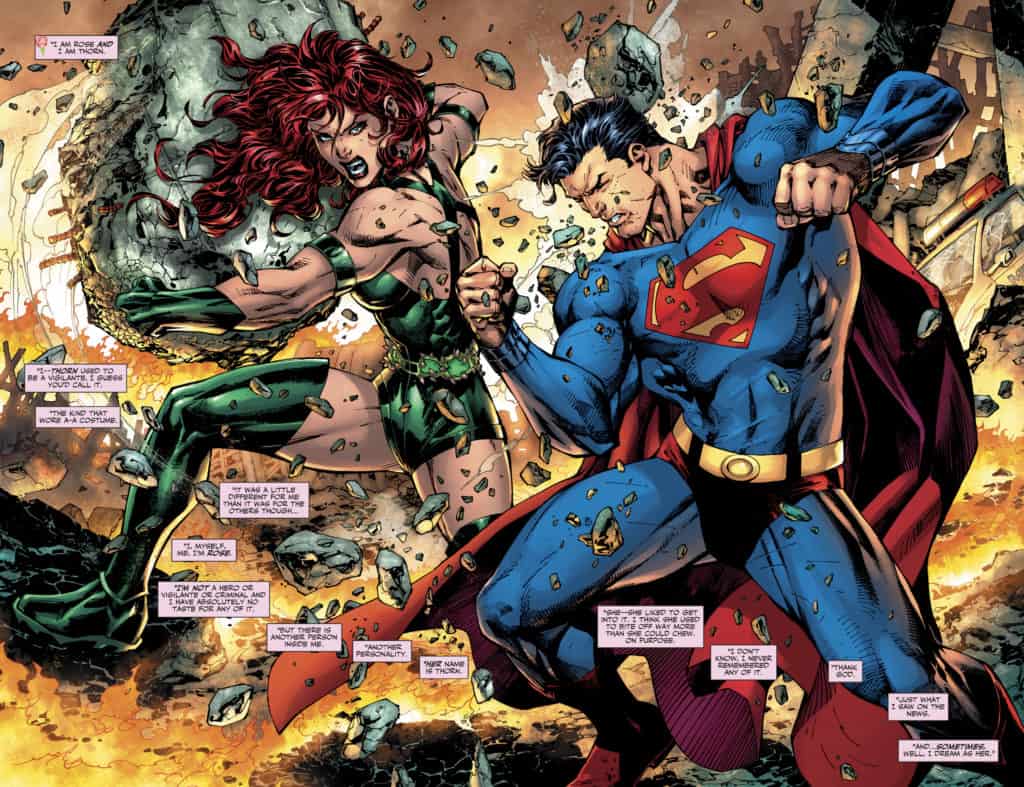
The second sequence features Batman Beyond, with art by Dustin Nguyen that couldn’t be any more different from Lee’s. It doesn’t really flow well, but again, Nguyen’s art looks absolutely phenomenal – he’s grown leaps and bounds in the last decade or so… and he was already one heck of a talent. It’s too bad the scene has no real depth to it, other than to give fans some Terry McGinnis catnip/fan service.
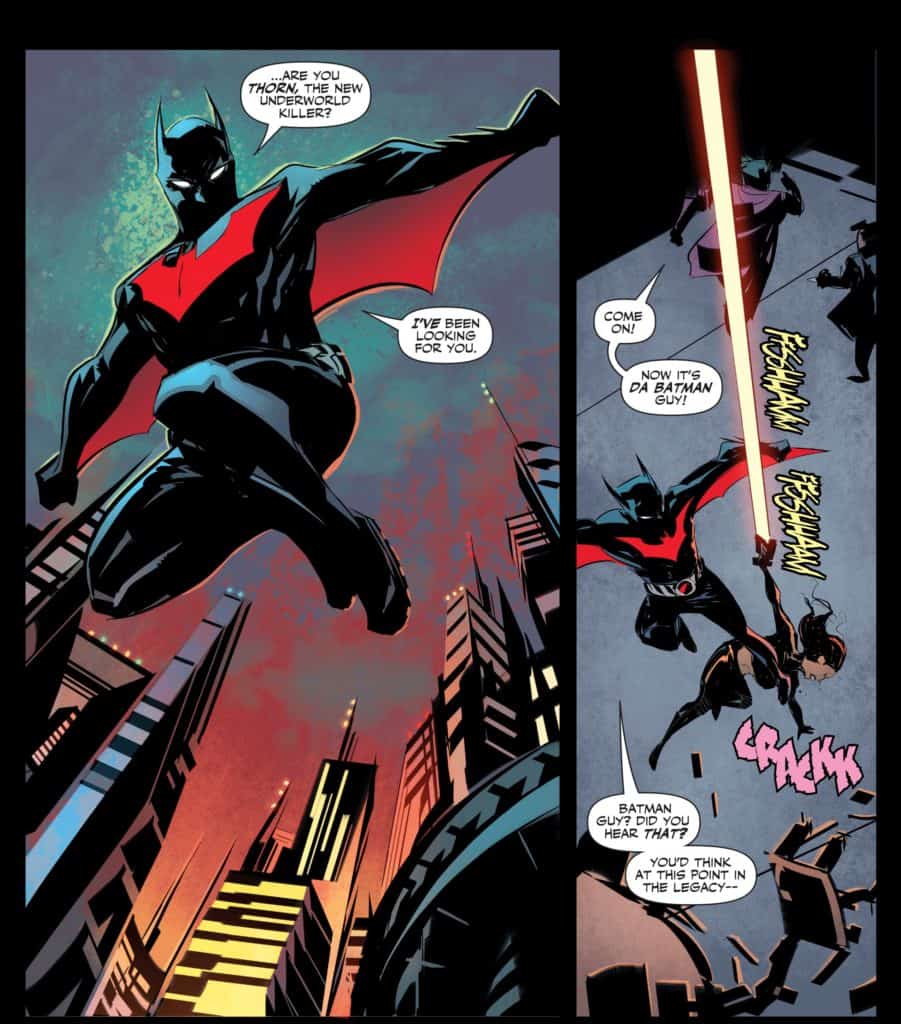
The next scene moves to the time of Kamandi, and really, is a mismatch for Andrea Sorrentino’s art style. Maybe it’s the character’s obvious connection to a Kirby-style art, but Sorrentino’s rough-hewn, thin linework and baroque page layouts feel disconnected from the character’s world. It might not be so noteworthy if the story had an weight to it, but alas, it’s an utterly vacuous affair. There’s some overtones toward the important symbolism of Superman’s suit in a world that’s lost all hope, but it’s nothing readers haven’t seen before.
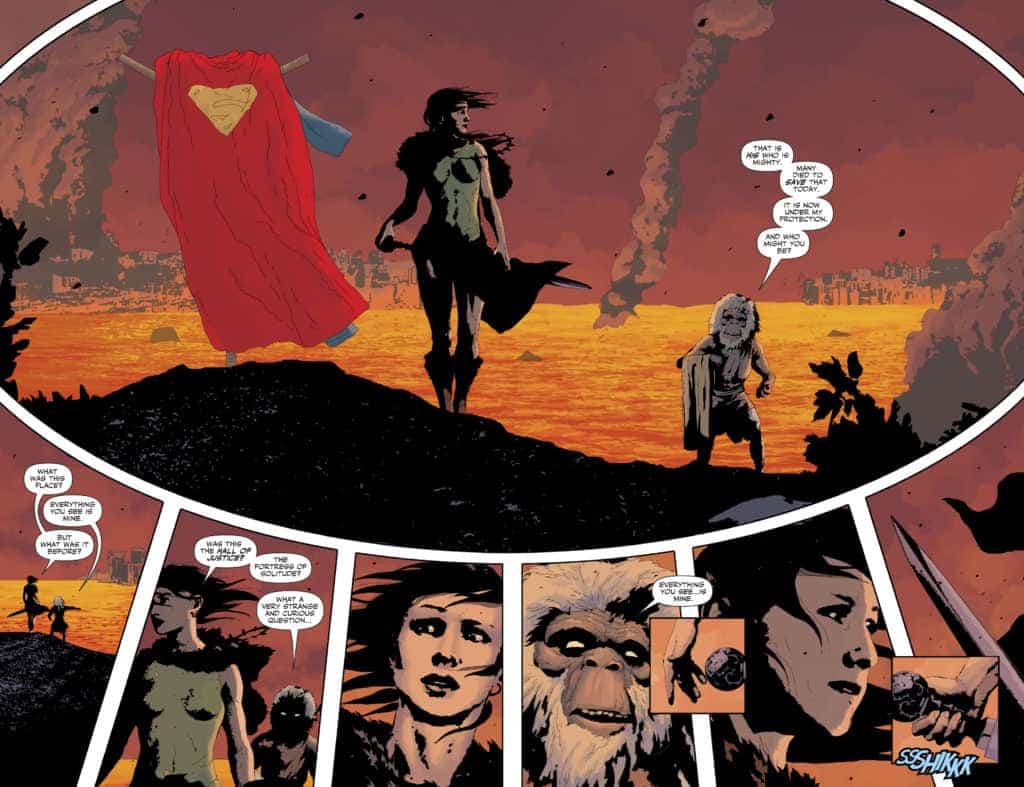
The final scene may be the most damning, though. Because nothing happens. Literally. Nothing. Rose and Thorn get into an argument with Tommy Tomorrow. Do any modern fans even know who he is? What’s his deal? Why should we care? Nothing about this character or his world is remotely explained. He could be a random background character working at Wendy’s for all we know. “Tommy Tomorrow” is just a name-dropped fan service for the couple dozen readers who still know who the guy is. And then, the extent of his story is that he as a superfluous conversation with Rose and Thorn, who after centuries of life, is growing more and more mad about society and her place in it as she persists in not aging. And then, security is called on her and she runs. And that’s the end of the comic. Boy, what a cliffhanger!
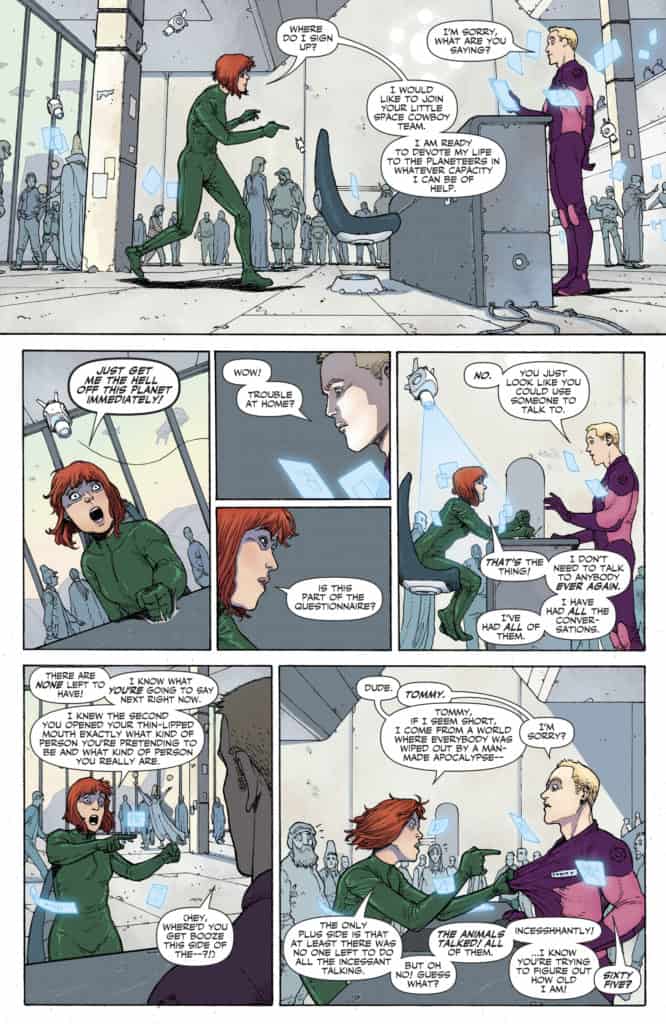
Brian Michael Bendis catches a lot of heat from a certain segment of fandom. Some of it’s justified, some isn’t. Some of it is they just don’t like decompressed storytelling. And that’s fine, if that’s the extent of it – to each their own. But that’s not to say that some of the slings and arrows hurtled his way aren’t always unjustified, either. And somehow, Legion of Super-Heroes: Millennium #1 manages to wrap all of his worst tendencies under one clean package: flyweight storytelling, barely-there plot, shallow characterization. But it’s so much worse this time, because of just how much was riding on this comic. This was supposed to be the return of the Legion of Super-Heroes! and so on. There’s no sense of grandeur or gravitas to this affair, just a loose collection of vignettes connected by a character no one really cares about except the author. Maybe Bendis just wasn’t the writer to deliver this tale. Maybe it’s too far out of his comfort zone. It may be too soon to judge his forthcoming Legion ongoing, but one thing’s for sure: it’s off to an exceptionally rocky start. The Legion of Super-Heroes is a cornerstone of the DC Universe, and they deserve better than this. And so do their fans.
Final Thoughts
Legion of Super-Heroes: Millennium #1 promises big and fails to deliver on almost every level. A complete and utter letdown both for fans of the Legion and Brian Michael Bendis, this comic doesn't even feature the eponymous team from the title. The story is choppy and disconnected and the protagonist isn't strong enough to carry the weight of this tale. The art, at least, is good - even if each artist doesn't complement the others very well. And the highly-touted streamlining of the future history of the DCU turns out to just be a lot of fan service. Just one issue in, and the Bendis era of Legion is in a lot of trouble.
Legion of Super-Heroes: Millennium #1 (of 2): Once More Into the Future
- Writing - 3/103/10
- Storyline - 1/101/10
- Art - 7/107/10
- Color - 7/107/10
- Cover Art - 7/107/10


